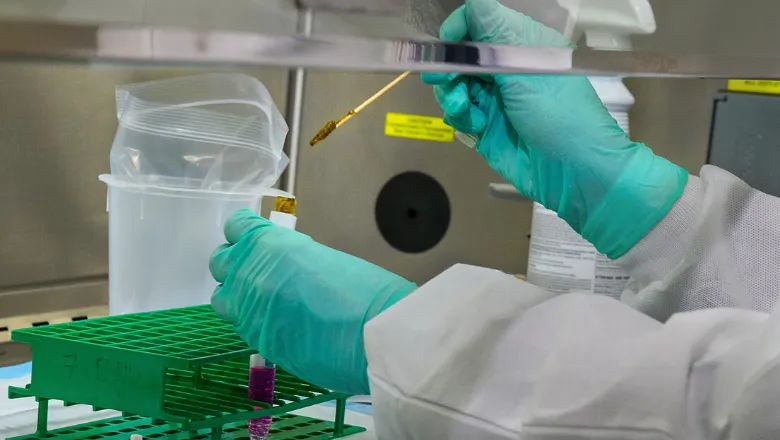The changes we’ve observed in the blood are not subtle and patients with these features seem more likely to experience severe disease, requiring intensive management.
Project lead Adrian Hayday, who heads the Crick’s Immunosurveillance Laboratory and is Professor of Immunobiology at the School of Immunology & Microbial Sciences at King's
22 May 2020
Blood test could track immune response to COVID-19
A highly detailed analysis of the composition of immune cells in the blood of patients with COVID-19, reveals new aspects of how the SARS-Cov-2 coronavirus causes disease.

This could help doctors predict at an early stage who might need additional treatments or critical care, and could guide treatment strategies.
Researchers at the Francis Crick Institute, King’s and Guy's and St Thomas' NHS Foundation Trust, are looking at patients’ blood to see how the immune system responds to coronavirus and how the virus ‘throws a spanner’ into the immunological works.
Based on the detailed analysis of 60 COVID-19 patients at St Thomas’ Hospital, the team has identified an ‘immunological signature’ of the disease. Within this, a small set of factors, or clues, could be used to identify the patients most likely to do worse and require additional treatment.*
In their preliminary analysis, the team have identified two prominent clues - an overt dysregulation in a specific type of T cell that ordinarily eradicates virus-infected cells, and a dramatic loss of immune cells called basophils that can be involved in tissue repair.
The team hopes that a blood test with this high level of resolution could be more broadly applied in hospitals to seek early indications of patient condition, and to effectively help prioritise treatments.**
This insight into how COVID-19 affects the body could also help inform studies looking to develop effective treatments and vaccines. For example, if scientists can uncover how the virus perturbs the workings of essential T cells, they could prioritise immune treatments and vaccines that promote those T cell activities.
Professor Hayday continued: “There’s a lot we still don’t know about this virus, but we have seen that it doesn’t simply discriminate according to age and underlying condition. Although in smaller numbers, younger, healthy individuals can also be struck down with severe symptoms.
The dedication of scientists and medical professionals, drawn from many different countries, who have come together to tackle this issue is incredible, and the speed that they have been able to gather these results is unprecedented.
Professor Hayday
As part of the ongoing study called COVID-IP, patients at Guys and St Thomas' who have agreed to donate to an infectious disease biobank, provide regular blood samples during their treatment for COVID-19. These are processed in secure containment at Guy’s Hospital before the composition and properties of immune cells are analysed in the team’s laboratories at King’s College London and at the Crick.
The perturbation of specific types of T cells observed so far suggests that in some patients, the virus is skewing the immune response and simply knocking out one of the body’s most critical natural defences.
When patients can’t mount an effective T cell response, there aren’t enough immune cells to clear the body of virus-infected cells. And as this situation persists and worsens, the remaining immune cells can become misguided, themselves causing damage to the lungs and other vital organs.
We routinely measure white blood cell counts, including lymphocyte and basophil counts in all hospitalised patients. Clearly, our new COVID-IP study highlights the enormous potential to measure the status of very specific types of immune cell involved in fighting the virus.
Manu Shankar-Hari, Reader and Consultant in Intensive Care Medicine at the School of Immunology & Microbial Sciences at King's King’s
He added: “Moreover, the study’s identification of detailed T cell deficits offers strong support for an international clinical trial in which we provide patients with recombinant IL-7, a natural drug that promotes T cell function. The trial has been designated an Urgent Public Health COVID-19 Trial by the Chief Medical Officer.”

